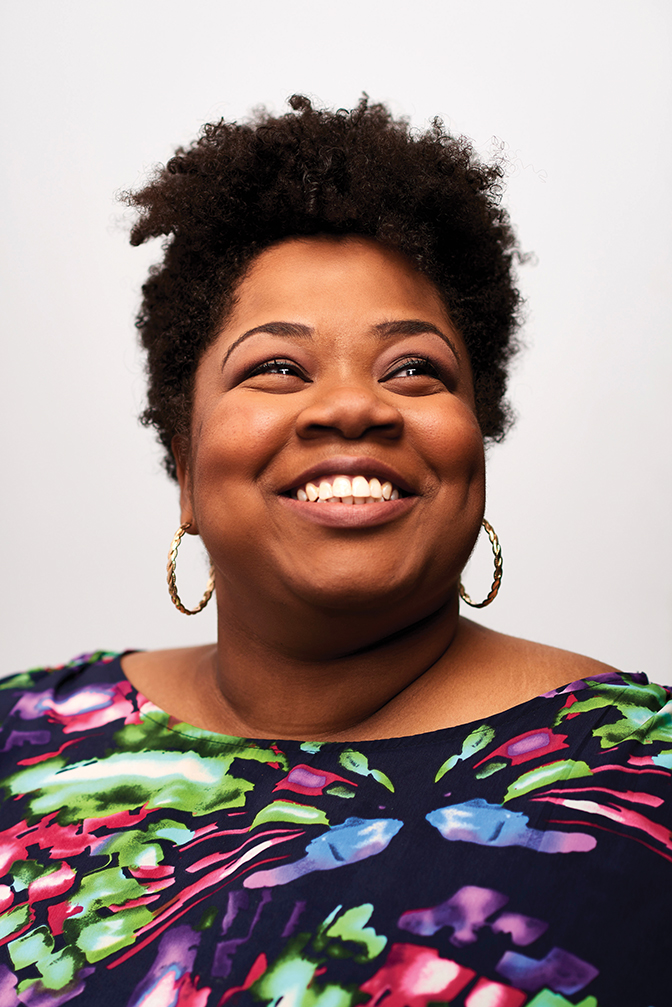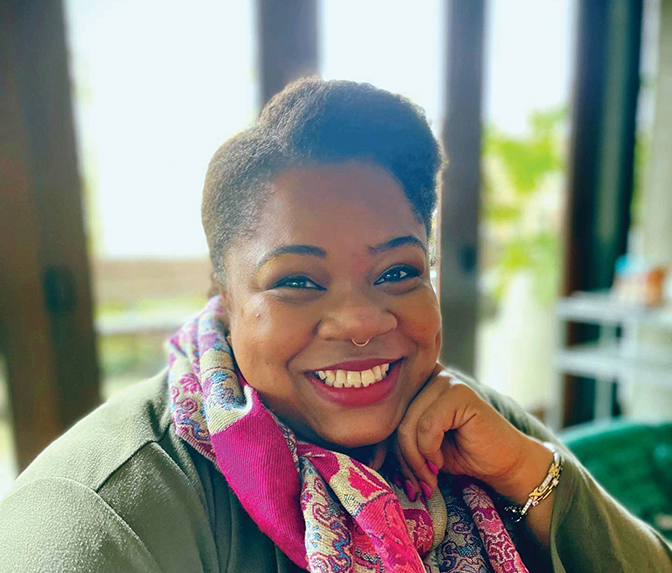Nina Yarbrough ’09 never dreamed she’d be a patron of the arts. The poet and playwright imagined she’d be on the other side, the one asking for money to pursue her own passions. But as the arts program director for 4Culture, the cultural funding agency for King County, Wash., Yarbrough doles out collected tax money for aspiring artists, organizations and groups. Her story is not one of fate or luck, though. It’s a tale of hard work—and the values she took with her from Berea.
Her story begins in Cincinnati, Ohio, where Yarbrough grew up the youngest of eight children in what she describes as a very noisy but musical household. She was “the nerdy little sister” who was into anime “before it was cool.” She loved reading. She loved school.
“School was my happy place,” she said, “because I was good at it. School for me was where I got to flourish and be my nerdy little self.”

Young Yarbrough dreamed big, imagining herself as president of the United States, or maybe a lawyer, but she had a talent for being on stage, making people happy, making them laugh.
“I learned very early on the power of humor and how quickly you can change a situation,” Yarbrough said. “I’ve been plus-sized my whole life, and I was somebody you could easily pick on, but I was also good at making people laugh to redirect attention. I learned very quickly being funny can get you out of a lot of situations.”
Many of those situations arose in her Cincinnati neighborhood in the 1990s, where Yarbrough says police and gun violence were a reality.
“It was a real possibility that I wouldn’t make it out of my neighborhood,” she said. “We didn’t live in poverty, but we were on the line. I knew from the get-go college was for me, was my way out of Cincinnati and my way into opportunity.”
Yarbrough had heard about Berea College through friends who were attending. She applied to other schools, but understood that without scholarships, she and her family were not going to be able to afford college. Berea’s no-tuition promise was a major selling point for the school, but she also wanted to see more of the world, and moving to Kentucky was a way of doing that.
“College for me was where you figure out who you are, what you’re actually interested in,” Yarbrough said. “And Berea was a very safe place for me to do that. I got to really dive into my passions around the creative and performing arts.”
The first-generation college student majored in theatre and took a job in the costume shop as a stitcher, sewing delicate fabrics for productions. She was cast in the show, “Rumors,” where she played Cookie Cusack. Eventually, she worked her way up to the head of makeup, which included hair design.
“I was able to put years of costuming experience and the fact I was able to design and all that on my résumé,” Yarbrough said. “It wasn’t just in a class. I was literally paid to do that, which was extremely helpful and important. And it taught me about teamwork and what it means to put together a good product, what it means to fix your mistakes. You learn how to be creative, how to move quickly and to deal with different types of people under high-pressure situations. And in all of my jobs, that has been my path.”
Yarbrough graduated into a recession, and opportunities were limited. Eventually, she took a job in the ticket office at the Cincinnati Museum Center before working her way up to being a program specialist, designing programs for the public inside the museum. But Yarbrough wanted more for herself, so in 2014, with $900 in her bank account, she moved to Seattle for graduate school, completing her Master of Fine Arts degree in arts leadership from Seattle University in 2016. During graduate school, she worked four jobs to get by.
“Berea teaches you how to hustle,” she noted.
She also credits Berea for her ability to go to graduate school at all. Because she left Berea with so little debt, Yarbrough says graduate school became a reasonable investment in her future. “I walked away with a fraction of the debt that most college students would walk away with,” she said. “So, when I thought about what that meant to come out and do grad school, I was like, ‘I can actually afford it.’”
But I think, for me, it kind of goes back to something Berea gave me—being of service to others. Berea has always had that, that service at the core of what it does, and it’s something that was instilled in all of its students.
Nina Yarbrough ’09
The connections Yarbrough made in graduate school allowed her to take a position in fundraising with the Seattle Opera. Again, she worked her way up, from capital campaign associate to capital campaign manager, running the organization’s $28.5 million capital campaign.
“I never would have thought about working for an opera company,” Yarbrough related. “I had these assumptions, like, ‘Oh, I’m not good enough or I don’t have a background in opera.’ But going through that program made me realize that I don’t have to be an opera person because I was a good employee. That was one of the things Berea gave me.”
Yarbrough continued to move up in her career, taking the position of business development manager for the Central District Forum for Arts and Ideas, a nonprofit dedicated to promoting Black artists. And last year, she was named the arts program director at 4Culture, which receives a percentage of a lodging tax in King County to distribute as cultural funding dollars. She sees her new position as an evolution of her own personal mission in life.
“For a long time, my mission was to create art myself and to figure out how to do that in the world,” she said. “But now that I’m on this side of things, it’s more about how do I facilitate that for others? But I think, for me, it kind of goes back to something Berea gave me—being of service to others. Berea has always had that, that service at the core of what it does, and it’s something that was instilled in all of its students.
“I’m figuring out this era of my life,” she continued, “and I know that at least part of it is about how can I show up for the world and do good? When it’s the end of my days, I can look back and say, ‘I did more good than harm, and I made things better.’”


